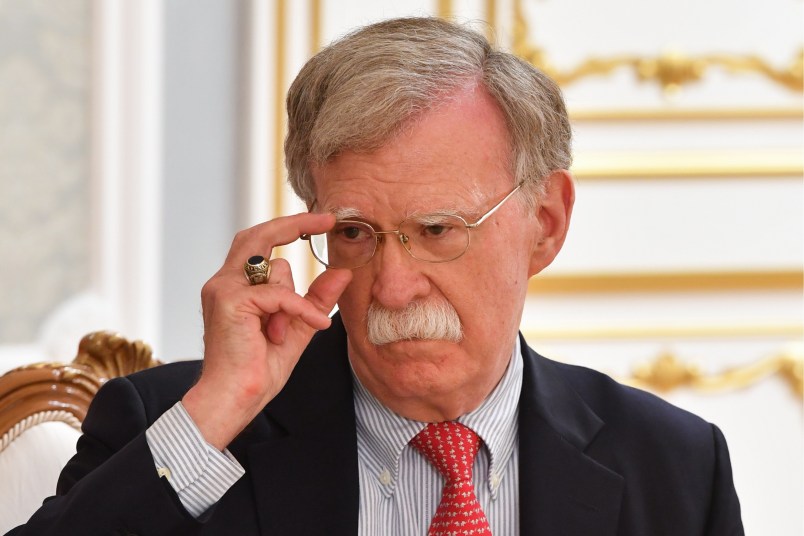The career government classification expert who was initially tasked with reviewing John Bolton’s book manuscript suggested this week that the process was politicized by the White House. The expert also alleged she had been pressured but ultimately refused to sign a misleading court declaration in the litigation that the Justice Department has since brought against President Trump’s former national security adviser.
The claims were made in a letter from an attorney representing the expert, Ellen Knight. The letter was filed Wednesday morning by Bolton in the civil case the Justice Department is pursuing against him for publishing his book.
Knight’s letter recounts several episodes where political appointees at the National Security Council took “unusual” steps to intervene in her review.
Knight said that, from the time she was assigned the review of Bolton’s book, the NSC legal team — and specifically then-NSC deputy legal adviser Michael Ellis — checked in with her repeatedly about the review and about any interactions she had with Bolton’s attorney.
Before moving to the White House, Ellis was a staffer for Rep. Devin Nunes (R-CA), the top Republican on the House Intelligence Committee.
The number of interactions between the career classification expert and the political appointees was “unprecedented” for a prepublication review process, Knight’s letter said, while alleging the political appointees were playing an “outsize role” in the process.
Knight said she was repeatedly instructed not to engage in these interactions over email, and instead, NSC political appointees had her read portions of the drafts over the phone to them.
“[Knight] had never previously been asked to take the above described measures, and she has never heard that predecessors in her position ever received such instructions in the course of their prepublication reviews,” the letter said.
As Knight was conducting her review, the letter said, Bolton’s lawyer asked that she prioritize the book’s Ukraine chapter so that it potentially could be released publicly while the Senate impeachment trial was underway. Ellis instructed Knight to “temporarily withhold” a response to the request, according to the letter.
Knight gave an assessment on April 28 that Bolton’s manuscript had been scrubbed of classified materials — an assessment she informally communicated to Bolton — but that didn’t end her interactions with the political appointees about the status of the review.
The NSC would not give her the greenlight to formally clear the book’s publication, and when she relayed Bolton’s repeated requests for a final clearance letter, she was told that such a letter was being delayed by the COVID-19 outbreak.
Only later would Knight find out that the “real” reason for the delay was that the NSC legal team was doing its own review of the manuscript, according to the letter.
On June 8, six weeks after Knight had okayed the book, she was caught “by surprise” with an assessment — made in a draft letter to Bolton that NSC legal adviser John Eisenberg showed to Knight — that the manuscript still contained classified materials.
That the NSC legal team had conduced its own review only became clear to Knight two days later, on June 10, when she was brought in for a meeting with Justice Department lawyers who were clearly “preparing for litigation” against Bolton, the letter said.
Before then, according to the letter, not once had the political appointees raised concerns that Knight’s team had not scrubbed out all the classified information still supposedly in the book. The letter went on to lay out the “fundamentally flawed” approach the NSC legal team took to determine that classified material remained in the manuscript.
Knight said that she continued to defend the work her team did to review the manuscript, according to the letter, including in a June 13 meeting with White House Counsel Patrick Philbin.
At that meeting, Knight also had to push back on the White House’s attempts to have her “concede that the whole prepublication process is simply a matter of opinion,” according to the letter.
Over the following five days, and over the course of 18 hours of meetings, “a rotating cast of Justice Department and White House attorneys tried to persuade Ms. Knight to sign a declaration they wanted to file with their lawsuit against Ambassador Bolton,” the letter said.
Knight pointed out several concerns she had about the substance of the declaration, according to her letter, and the attorneys also refused to give her information she wanted about how they intended to use the declaration in the case.
When she refused to sign it at the end of those string of meetings, that was the last she discussed with the NSC legal team Bolton’s book or the litigation, her letter said.
The letter wraps up with an implication that Knight suffered professionally because of her refusal to go along with the White House’s machinations. She was on a two-year detail the the NSC from National Archives and Records Administration. After she received a promotion in December, she was told she’d be given the option at the end of her detail to join the NSC permanently, the letter said.
As the end of the detail approached, she instead received an automated message reminding her time at the NSC was winding down.
“When she then asked the NSC Executive Secretary about the prospect of a direct hire he consulted with the NSC Chief of Staff and the NSC Legal Advisor, who informed him that that was no longer a possibility, and that ‘there is no path forward for [Ms. Knight] at the NSC,’” the letter recounted.
Read the letter below:



